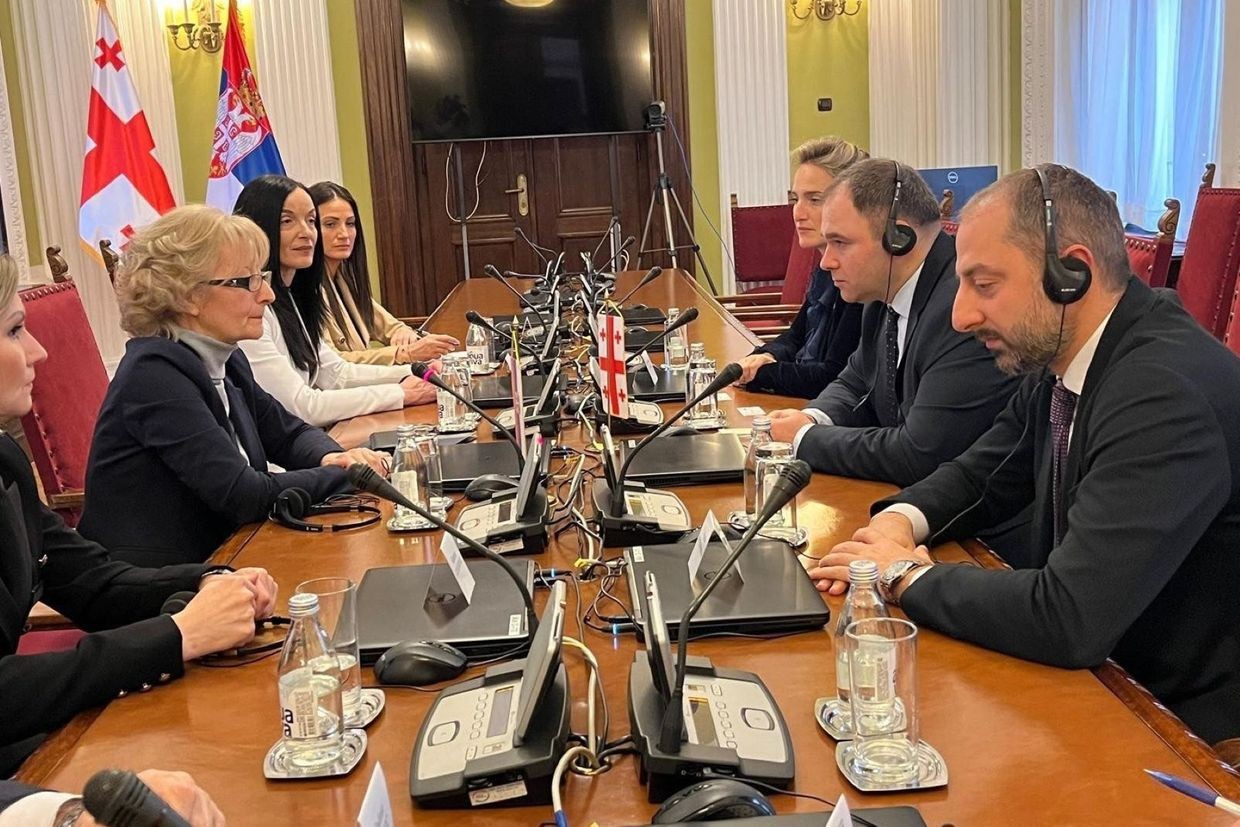
Georgian and Serbian officials have highlighted their countries’ ‘common features’ — territorial disputes, supposed EU membership aspirations, and ‘domestic political dynamics’ — during a visit by a Georgian parliamentary delegation to Belgrade amidst mass anti-government protests there.
On Tuesday, Nikoloz Samkharadze, Chair of the Foreign Relations Committee of Georgian Parliament, along with a delegation of other officials, met in Belgrade with the Deputy Speaker of the Serbian Parliament and Chair of the Foreign Affairs Committee, Marina Ragus, along with other Serbian politicians.
According to Samkharadze, the main foreign policy goal of Georgia and Serbia is to join the EU, and both countries face similar domestic political challenges.
‘Georgia and Serbia share many common characteristics’, he said. ‘First and foremost, both countries hold EU candidate status and share the same foreign policy goal — joining the European Union’.
‘Notably, we both face challenges to territorial integrity and experience similar domestic political dynamics. We have excellent political relations and unconditionally support each other’s territorial integrity. This strong political foundation should lead to even closer cooperation’.
The Georgian delegation expressed hope that ‘in the coming months’, a Serbian embassy would open in Tbilisi, and Georgia’s diplomatic mission in Serbia would also turn into a full–fledged embassy.
‘We also see potential for growth in trade and tourism’, Samkharadze said.
According to the Georgian Parliament, the delegation and its hosts ‘welcomed the entry of a Serbian airline into the Georgian aviation market, which will begin operating regular Belgrade-Tbilisi flights starting 15 June’.
Speaking to the media after the meeting, Samkharadze said that Air Serbia, ‘Serbia’s main airline, made the final decision during our visit to launch direct flights to Tbilisi from Belgrade’.
In its statement, the Serbian Parliament noted that Kovács ‘stressed that joining the EU is Serbia’s strategic goal and that our country has been negotiating the issue for 13 years now, adding that the experiences from the process could be useful to Georgia, especially those related to defining the role of the European Integration Committee and the National Assembly in the process’.
Serbian MP Života Starčević, a member of the parliament’s European Integration Committee, said that Serbia and Georgia ‘share similar experiences in terms of protecting their territorial integrity and sovereignty and thanked Georgia for its principled position and non-recognition of the self-declared independence of the southern Serbian province of Kosovo–Metohija’.
‘He stressed that this is a vital issue from the aspect of the country’s advancement toward European Integration’, the statement read.
The visit comes against the backdrop of monthslong anti-government protest movements that have been occurring simultaneously in both Serbia and Georgia.
In Serbia, the protests followed the 1 November collapse of a concrete ceiling at the train station in Serbia’s second largest city, Novi Sad, which killed around 15 people. Demonstrations have continued almost without pause since then.
On 19 March, the Serbian government resigned. Although Prime Minister Miloš Vučević announced his resignation in January, the Serbian parliament formally approved his resignation in March.
Nonetheless, President Aleksandar Vučić, the leading political figure in the country, has remained in power. Following Vučević’s resignation, Vučić said that if a new government cannot be formed within 30 days, early parliamentary elections will be called in June.
In Georgia, the political crisis deepened when Prime Minister Irakli Kobakhidze announced in late November that the government was halting Georgia’s EU bid ‘until 2028’, sparking daily mass protests during which more than 400 demonstrators were reported to have been detained thus far.
Since the protests began, law enforcement officers and unidentified masked people have assaulted a number of protesters, including tens of journalists covering the protests.











